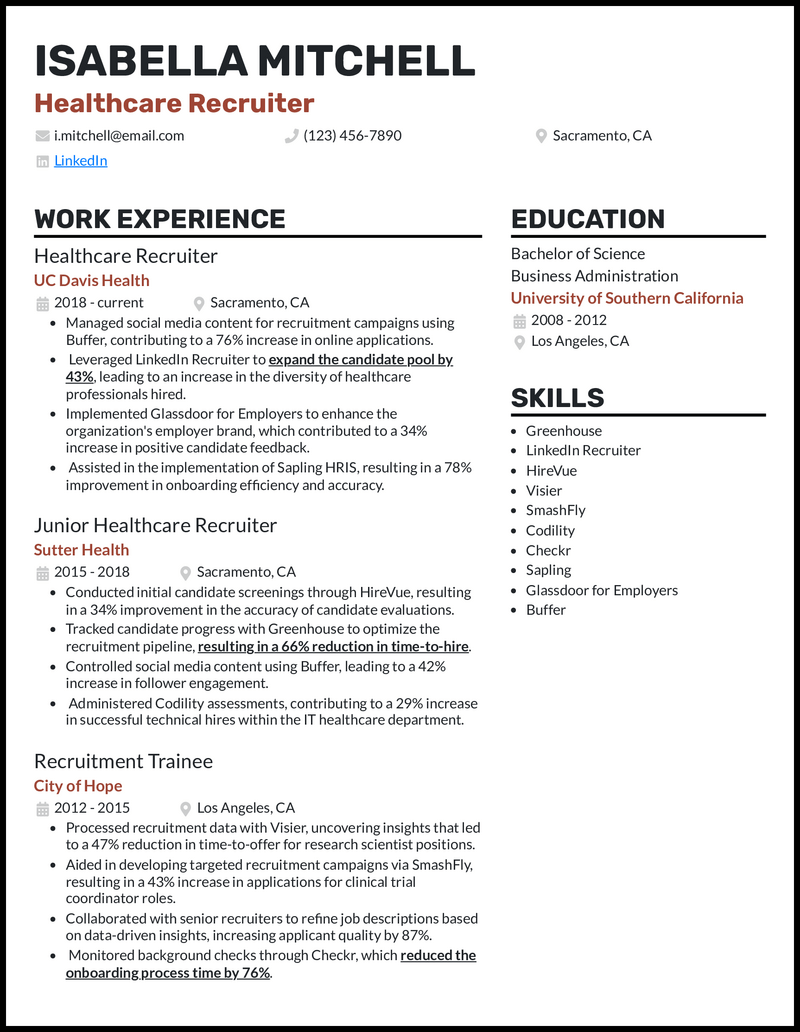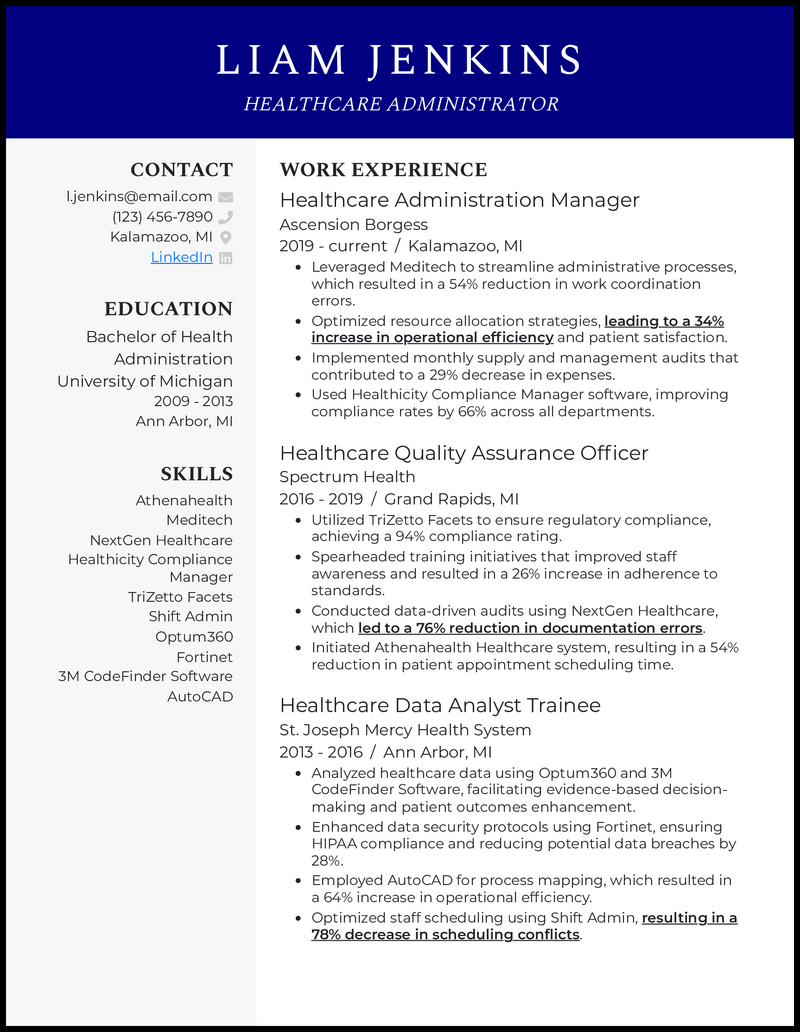The first duty of your recruiting role is to ensure you bring onboard the best there is. While this is important, you want to show what more you can bring to the table.
- Additionally, prove the processes involved in hiring the creme de la creme of healthcare workers. What is your track record in onboarding? How did you ensure diversity in your hiring? Ensure all these are reflected in your healthcare recruiter resume as Isabella did.
Related resume examples
- Medical Assistant
- Case Manager
- Recruiter
- Human Resources (HR)
- Administrative Assistant
Adapt Your Healthcare Resume to Match the Needs of the Role

Through your experience in the healthcare industry, whether in the business, administration, or recruitment side of things, you’ve accumulated a unique set of trade-specific skills.
Given the specialized nature of the healthcare industry, it’s best to keep your skills section focused on the unique aspects of your job. This includes software proficiencies and industry know-how that help you thrive on the job. Your time management and leadership are vital, but you can let them shine through your work experience instead.
Focus on your expertise in navigating software for EHR management, medical billing, and scheduling. Always make sure to get into the specifics. If you’re a healthcare recruiter, dive into your familiarity with ATS, and platforms like LinkedIn and Glassdoor.
Need some ideas?
15 popular healthcare skills
- Epic
- PACS
- NextGen Healthcare
- Medtronic Carelink
- Meditech
- Athenahealth
- 3M CodeFinder
- HealthShare
- Greenhouse
- LinkedIn Recruiter
- Glassdoor
- EHR Management
- Medical Billing
- Contract Negotiation
- Managing Stakeholders

Your healthcare work experience bullet points
Your work hinges on using metrics to analyze candidates, financial data, and compliance reports. In much the same way, recruiters rely on concrete statistics to help them gain insight into your potential impact.
To really impress them, make sure to include some exciting metrics to back up your achievements. For instance, rather than just stating that you were responsible for streamlining billing processes, say that you utilized medical billing software to reduce error occurrences by 24%.
If you can find a useful metric for each career highlight that you mention, you’ll really harness the power of data to impress your potential employer.
- Underscore the effectiveness of your cross-departmental work, highlighting the resulting reductions in patient data retrieval times.
- Emphasize the increases in candidate pool sizes and application numbers your recruitment campaigns and methods led to.
- Showcase your commitment by citing the high compliance rates you maintained, and increases to compliance rates your work led to.
- Highlight improvements to accuracy rates and reduction in medical and work coordination errors resulting from your quality improvement initiatives.
See what we mean?
- Championed the integration of SimMan simulation technology in training programs, enhancing staff preparedness and reducing medical errors by 54%
- Collaborated with multidisciplinary teams, utilizing Epic and HealthShare systems, which led to a 46% reduction in patient data retrieval time
- Leveraged LinkedIn Recruiter to expand the candidate pool by 43%, leading to an increase in the diversity of healthcare professionals hired
- Used Healthicity Compliance Manager software, improving compliance rates by 66% across all departments
9 active verbs to start your healthcare work experience bullet points
- Collaborated
- Spearheaded
- Leveraged
- Implemented
- Optimized
- Managed
- Streamlined
- Achieved
- Led
3 Tips for Writing an Entry-Level Healthcare Resume
- Highlight your certifications
- If you have relevant certifications such as Certified Medical Manager (CMM) or Certified Personnel Consultant (CPC), highlight them on your resume. While they’re rarely mandatory, they communicate your specialized knowledge of the healthcare industry.
- Express your compliance
- Showing off your mastery of compliance can help set you apart from other entry-level candidates. Highlight your knowledge of relevant compliance frameworks, such as HIPAA for patient data, JCAHO standards for healthcare facilities, or specific regulations for recruiting medical professionals.
- Align with the job requirements
- In your skills section, focus on those emphasized in each job description that you’re proficient in. For instance, if you’re applying to a healthcare administrator role that emphasizes EHR management proficiency, make sure you put it at the top of your skills list.
3 Tips for Writing a Healthcare Resume if You Have Several Years of Experience
- Showcase your leadership
- If you have experience leading a team, mentoring new employees, or providing training, dive into the details and emphasize the results. For instance, talk about how you led a team of five healthcare billing professionals, achieving a 28% increase in reporting accuracy.
- Emphasize your impact on patient care
- It’s vital to show how patient care has been central to your approach. Discuss initiatives or systems you’ve spearheaded that had a positive impact, such as the patient appointment system overhaul you led, which resulted in a 23% increase in patient satisfaction scores. Spend time in your healthcare cover letter detailing the methods to your madness!
- Demonstrate your efficiency
- Recruiters look for experienced healthcare professionals who can help save money for their organizations. Detail how your work has reduced operational costs or bolstered the efficiency of certain processes. For instance, dive into the monthly supply and management audits that you implemented, which led to a 29% decrease in expenses.
How can I make my resume stand out?
To make your resume stand out, study each job description and identify the skills and responsibilities they emphasize. Highlight these skills in your resume. For example, in a healthcare executive role, focus on your ability to lead teams and manage stakeholders.
What if my experience is in another field?
If you’re transitioning from a different role within the healthcare industry, or a different industry entirely, focus on the relevant transferable skills. For instance, if you have a background in customer service, highlight how you could apply the skills you gained to better handle patient inquiries as a healthcare administrator.
How can I show my adaptability?
Discuss instances where you’ve had to adapt and excel in changing environments. As an example, talk about how at the start of the pandemic, you streamlined patient scheduling and billing in order to maximize appointment slots.














![]()